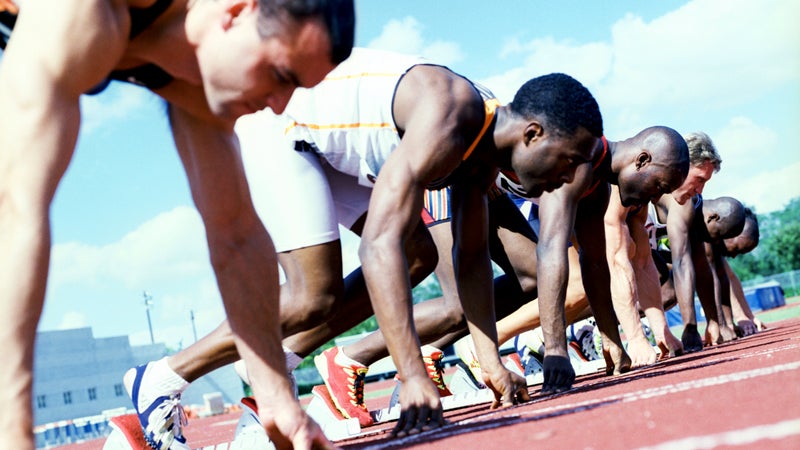When it comes to performance anxiety, fitness competitions can be a lot like taking the SATs or giving an important speech. And yes, over-thinking or stressing about them beforehand can, indeed, cause you to “choke,” according to a study presented last week at the British Psychological Society’s annual conference.
Sports scientists at Coventry and Staffordshire universities in the UK twice tested the coordination and anticipation abilities (i.e., how well they could catch a ball or strike an object) of 18 young, healthy adults—once in a no-pressure “practice” situation, and one in a high-stakes “competition.” And, as suspected, they found that the subjects’ performance was significantly worse during competitive scenarios.
“Our research indicates that heightened cognitive anxiety, brought on by the competitive scenario, really does affect performance abilities in physically active people—and the same is likely to apply even for trained athletes,” says lead author Michael Duncan, PhD. And the event doesn’t have to involve complex coordination, either: Researchers have documented cases of athletes choking in everything from running races to golf matches.
So what can you do about it? These tips may help keep you in a positive (and peformance-friendly) mindset before and during your event.
Play down the pressure to win. “The athlete and coaching staff needs to approach a big match in the same way they always do, and not deviate from the normal,” says Duncan. “Reduce any dwelling on possible outcomes, and only focus on what you can do yourself and the things you can change.”
Distract yourself. Performance errors often come from over-analyzing, says Sian Beilock, Ph.D., psychology professor at the University of Chicago and author of Choke. Finding a way to keep your mind occupied on something else—like counting backward or singing a song before the starting pistol goes off—can help prevent athletes from getting caught up in the “what ifs.”
Practice under pressure. “There is some suggestion that this type of anxiety is experience-related,” says Duncan. “So getting more experience in high-stakes situations may inoculate the athlete somewhat if they are in a similar situation in the future.” Can’t compete every weekend? Make your practices feel true-to-life by “rehearsing” as much of the event as possible—wear your planned outfit, eat the same foods, follow the same schedule, and maybe even place a friendly wager on your performance with a teammate or friend.
Learn from past failures. If you’ve messed up in the past, don’t think negatively about those performances, says Beilock. Instead, use them to focus on what you’ll improve this time around. Studies on Olympic swimmers have found that when athletes use this type of positive, constructive mindset to view videos of their previous meets, their brains were more primed for action and improved competition.
Bottom line: It’s all about how you interpret those pre-competition jitters, says Duncan. “They can be seen as a challenge or as a threat. If you see it as a challenge, you are more likely to embrace the feeling and be more in ‘flow’ in terms of performance.”

